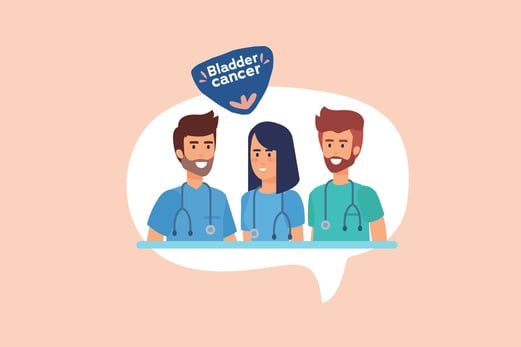Bladder cancer: symptoms, causes, and treatment
Know the symptoms of bladder cancer. An early diagnosis and prompt treatment could save your life.
There are some 500 new cases of bladder cancer diagnosed in New Zealand each year, and nearly 250 Kiwis will die from the disease. Bladder cancer affects four times as many men as it does women, and more frequently those aged over 60.
The bladder is a hollow-shaped organ located in the lower pelvis. It’s part of the body’s blood filtering system and has the ability to store and excrete urine out of the body.

Health | Life | Trauma | Total and Permanent Disability | Income Protection
Learn more on different types of insurance from an expert licenced financial adviser and see what's best for your circumstances.

Learn more about different types of insurance from a licenced financial adviser and see what's best for your circumstances.
Health | Life | Trauma | Total and Permanent Disability | Income Protection
What is bladder cancer?
Occasionally, the ‘building block’ cells which make up the bladder grow abnormally and become cancerous lumps or tumours.
There are several types of bladder cancer, but around 90% of cases are known as transitional cell carcinomas. These begin in the cells of the bladder’s inner lining.
Five-year survival rates for bladder cancer are around 51%. But early diagnosis and effective treatment can increase your odds, so you need to know the symptoms.
Symptoms of bladder cancer
A common early symptom of bladder cancer is blood in the urine. This is not usually painful and may appear suddenly, then disappear, only to recur at intervals.
Other cancer of the bladder symptoms include:
- Burning sensation or pain when passing urine
- Frequent or urgent need to urinate
- Difficulty urinating
- Lower back ache
- Stomach pain.
These symptoms could also indicate other conditions, such as a urinary tract infection (UTI), kidney stones, or prostate enlargement.
Don’t hesitate to see your doctor, especially if symptoms last longer than two weeks.
What causes bladder cancer?
It’s not always clear what causes bladder cancer but there are some factors that greatly increase your risk of developing the disease. These include:
- Smoking (tobacco)
- Gender (males are four times more likely to develop bladder cancer)
- Being over the age of 60
- Workplace exposure to hazardous chemicals
- Multiple urinary tract infections
- Family history
- Specific chemotherapy drugs
- Type 2 diabetes drugs.
Other factors may affect your risk, too, including diet and general health.
Bladder cancer can develop slowly - one reason it’s more commonly detected in those over 60. For example, you may have been unknowingly exposed to cancer-causing chemicals two or three decades before cancer appears.
An early diagnosis of bladder cancer is essential for successful treatment. If you experience symptoms, don’t delay seeing your doctor.
Bladder cancer diagnosis
After listening to a description of your bladder cancer symptoms, the doctor will perform a physical examination and organise blood tests. These tests provide a picture of your general health and kidney and liver function.
Other tests will usually include:
- Urine analysis - to check for blood or infections
- Urine cytology - multiple samples are examined under a microscope for signs of cancer
- Imaging scans - such as ultrasound, MRI or CT - help identify tumours
- Cystoscopy - a miniature camera on the end of a tube provides images
- Biopsy - doctors remove tissue for analysis.
If tests show you have cancer, your medical team will meet to discuss options. Working out how advanced your cancer is will help you plan your treatment. Doctors use a system known as staging for this important step.
Bladder cancer stages
Most medical professionals in New Zealand use the TNM system to map out the stage of your bladder cancer. The TNM system measures the size and spread of cancer tumours and looks like this:
(T) - Tumour size = numbers 1 to 4 show tumour size and depth (4 is most severe).
(N) - Node = numbers 0 to 3 show whether lymph nodes are affected (3 most severe).
(M) - Metastasis = indicates whether cancer has spread beyond the bladder (0 = no spread, 1 = spread to other organs).
Doctors put this information together to give your cancer a stage classification. They might also add grades from 1 to 3 which give extra detail about how quickly the cancer cells are growing.
Grade 1 is the lowest grade and tells us that the cancer cells look almost normal and are slow growing. Grade 3 is the highest and indicates that the cancer cells are abnormal and growing quickly.

Bladder cancer treatment
The medical team will discuss treatment options with you whilst taking into account your age, health, and personal preferences.
Most treatment programmes for bladder cancer involve surgery. Doctors may sometimes use chemotherapy before surgery. This shrinks the tumour, so it's easier to remove.
Surgery
The surgeon will extract your tumour, plus some of the healthy tissue around it to ensure that all cancer cells are removed.
Transurethral resection of bladder tumour (TURBT) - An electrical current is passed through a tiny wire to slice out the tumour. This type of surgery is often very effective for less invasive cancers.
Radical cystectomy - The surgeon removes the entire bladder, plus nearby organs, tissues, and lymph nodes. This is major surgery and can have a significant impact on your sexual and reproductive capacities.
Additional surgery - If the bladder has been removed, you’ll no longer be able to process and pass urine. Your surgeon will create another outlet for this function, which could involve:
- Some kind of pouch to store urine
- A tube leading to an external bag that is manually emptied
- A bladder reconstruction.
Each of these methods has potential drawbacks, and your medical team will advise you on the best path forward.
Chemotherapy
Powerful drugs delivered across a series of cycles. For small, non-invasive cancers, the drugs may even be placed directly into the bladder. This method reduces the side effects and potential damage to healthy cells.
Immunotherapy
May be used to treat less advanced cancers. Immunotherapy drugs trigger your immune system to fight cancer, either by boosting the immune system or making the cancer cells more obvious targets.
Radiation therapy
Intense x-rays are used to kill or damage cancer cells. Radiation therapy may be used in combination with surgery or chemotherapy. It’s often helpful for advanced cancers when surgery is not an option.
What are the chances of surviving bladder cancer?
It’s not possible to predict how long you’ll survive if you develop bladder cancer. Your response to treatment will depend on how advanced the cancer is, your age, general health, and other factors. As with most cancers, your chances of surviving cancer are much higher with early diagnosis and prompt treatment.
Are you prepared for life’s uncertainties?
You may not have bladder cancer but that’s no guarantee it won’t happen to you or someone you love. Think about how health insurance can prepare you for the possibility.
And not all health insurance plans are the same. Some plans only pay for a tiny fraction of your treatment expenses.
Don’t let this happen to you. When buying health insurance, talk to a Policywise adviser about maximum benefit amounts for cancer treatments, non-Pharmac cover, inclusions, and any exclusions.
We provide clear, easy-to-understand plan comparisons from different insurers so you can choose the policy with the best cover. Our service is free - and it might just change your life for the better.
Important Disclaimer: The information on this website is general in nature and does not consider your personal situation. It is not intended as a definitive financial guide. Before making any KiwiSaver or insurance decisions, we recommend speaking with a licensed Policywise adviser.
Policywise advisers are licensed by the Financial Markets Authority to give financial advice on KiwiSaver and health, life, and disability insurance. For more, see our Public Disclosure page.
All insurance is subject to insurer approval. Policies may include stand-down periods, exclusions, terms and conditions, and premium loadings not listed here. Optional (add-on) benefits come at an extra cost. Please refer to the relevant policy document for full and current details, as insurers may update these at any time.
Product pages on this site are summaries only. In the case of any difference between website content and the provider’s official policy wording, the provider’s wording will apply.
Quickly find the cover that’s best for you
Policywise tells you which health, life or disability insurance best matches your circumstances, 100% free. Talk to one of our insurance advisers to find out which health or life insurance is best for bladder cancer, and other serious illnesses.
References
- New Zealand - International Agency for Research on Cancer. Retrieved 12/10/2022 https://gco.iarc.fr/today/data/factsheets/populations/554-new-zealand-fact-sheets.pdf
Cxbladder. (2022, Apr. 12). Bladder Cancer Symptoms. Retrieved 12/10/2022 https://www.cxbladder.com/nz/bladder-cancer/symptoms/ - Auckland Urologist Mischel Neill. Bladder Cancer Takapuna | Radical Cystectomy Surgery Auckland | Intra-Vesical Treatment. Retrieved 12/10/2022 https://www.aucklandurologist.co.nz/
- Cancer Council. Bladder Cancer: Causes, Symptoms & Treatments. Retrieved 12/10/2022 https://www.cancer.org.au/cancer-information/types-of-cancer/bladder-cancer
- Cancer Research UK. (2022, Sept. 7). Bladder Cancer. Retrieved 12/10/2022 https://www.cancerresearchuk.org/about-cancer/bladder-cancer
- Cancer Research UK. (2022, Sept. 15). Symptoms of Bladder Cancer. Retrieved 14/10/2022 https://www.cancerresearchuk.org/about-cancer/bladder-cancer/symptoms
- Cancer Council. Stages of Cancer. Retrieved 14/10/2022 https://www.cancer.org.au/cancer-information/stages-of-cancer
- Cancer Research UK. (2019, June 19). Bladder reconstruction (neobladder). Retrieved 14/10/2022 https://www.cancerresearchuk.org/about-cancer/bladder-cancer/treatment/invasive/surgery/bladder-reconstruction
- Cancer Council. Immunotherapy. Retrieved 14/10/2022 https://www.cancer.org.au/cancer-information/treatment/immunotherapy
Urology Associates. (2017, Aug. 15). Bladder removal surgery. Retrieved 14/10/2022 https://www.urology.co.nz/info/cystectomy
ON THIS PAGE
Download our insurance comparison chart
We need a few details before we can send you this content…
* All fields are required

